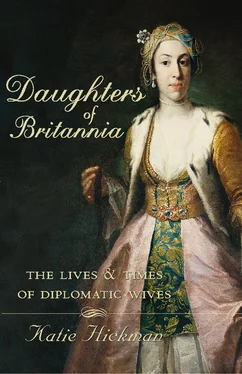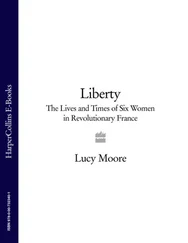Few buildings in history have had the sinister beauty of this fabled pleasure dome. No contemporary Christian king, and only a few since, had aspired to anything that equalled it. Built around six great courtyards, and covering as much land as a small town, this city within a city was the focus of all life in Constantinople. The Seraglio was not only the symbol of all power in the great Ottoman empire but also, to the dazzled imagination of foreign travellers, the seat of all pleasures too. For it was here, too, that the Grand Seignior’s harem was incarcerated – several hundred concubines, beautiful slave girls bought from as far away as Venice, Georgia and Circassia and kept, out of sight of other eyes, for the Sultan’s delight alone.
Here, every day, as many as 10,000 people were catered for – including the four corps of guards who protected the Seraglio, the black and white eunuchs, the palace slaves, its pages, treasurers, armourers, grooms, physicians, astrologers and imams, as well as the Sultan and his family. According to one estimate there were 1,000 cooks and scullions working in the palace kitchens which, in addition to staples such as meat and vegetables, produced jams, pickles, sweetmeats and sherbets in quantities ‘beyond possibility of measure’. 1
Opposite the Seraglio, and close enough to be easily visible from it, rose the graceful shores of Asia, a pleasing prospect of wilderness interspersed with villages and fruit trees. And on the narrow stretch of water in between them sailed the water traffic of the world.
It was three months since the ambassador’s entourage had set sail, and the journey had not been an easy one. On New Year’s Day, just after they had left Smyrna on the last leg of their voyage, a tempest had all but tossed them into oblivion. During the week of the storm their vessel had been cast upon rocks five times, leaving every man on board fearing for his life. It was an escape ‘so miraculous and wonderfull, considering the violence of the storm, the carere and weight of our ship, as ought to make the 8 day of January for ever to be recorded by us to admiration, and anniversary thankfulness for God’s providence and protection,’ wrote one witness. 2
Now, the ambassador’s storm-battered, leaky little ship – its masts, yards and decks encrusted eerily with white salt from the continual spray of the sea, its flags and ensigns flying, its guns at the ready – sailed across the last stretch of the Sea of Marmara and into the Bosphorus at last. It must have seemed to those on board as if they had reached the very epicentre of the world.
In many ways, of course, they had. Whoever controlled Constantinople controlled not only the great gateway between Europe and Asia, but also one of the greatest water trade routes linking the northern and southern hemispheres. Looking north, the Black Sea gave access through the Volga to southern Russia, and through the Danube to the Balkans and eastern Europe. To the south, the Sea of Marmara led not only to the Aegean, but to the whole of the Mediterranean, North Africa and beyond. In amongst the fishing boats and the caiques, the galleons and perhaps even one of the Sultan’s magnificent gilded barges, sailed innumerable vessels from all four corners of the earth – merchant ships, slave galleys and vast timber rafts cut from the deep forests of southern Russia and floated down the Bosphorus for shipbuilding and fuel.
On the captain’s orders the men lined the rigging, their muskets at the ready. As the ship drew close to the Sultan’s palace, in a suffocating cloud of gunpowder, a salutation of sixty-one guns was fired. A little while later, when the ambassador finally disembarked, it was to a second deafening salute of fifty-one guns. His welcoming committee comprised not only his own servants, English merchants, and other travelling companions brought with them from Smyrna, but also many of the Grand Seignior’s officers who had come to honour him. Their procession was so splendid that multitudes of people flocked from all parts of the city to watch them, and made ‘the business of more wonder and expectation’. ‘As we marched all the streets were crowded with people and the windows with spectators, as being unusual in this countrey to see a Christian Ambassadour attended with so many Turkish officers,’ wrote the ambassador’s secretary. He was so proud of their ‘very grand equipage’ – believing that ‘none of his predecessours, nor yet the Emperour’s Ambassadours, can boast of a more honourable nor a more noble reception’ – that he recorded each element:
1. The Vaivod * of Gallata and his men
2. The Captain of the Janizaries with his Janizaries
3. The Chouse Bashaw with his Chouses †
4. The English Trumpeters
5. The English horsemen and Merchants
6. My Lord’s Janizaries
7. The Druggerman ‡
8. My Lord himself with Pages and Footmen by his side
9. My Lord’s gentlemen
10. The officers and reformadoes of the ship. 3
From the brief account of the voyage which has come down to us, we know that the Sultan presented the embassy with ten sheep, a hundred loaves of bread, twenty sugar loaves and twenty wax candles. We also know that the ambassador distributed money among the people, and was visited by the messengers of other foreign ambassadors to the Porte. We know that he was given audiences with both the Grand Vizier, and with the Grand Seignior himself.
But we can only speculate about the Countess of Winchilsea’s role in all this. The fact that we know she was there at all seems almost accidental. At the very tail end of the procession, in between ‘my Lord’s gentlemen’ and ‘the officers and reformadoes of the ship’, the ambassador’s secretary has inserted one simple phrase: ‘My Ladies Coach’. With these three small words, my Lady Winchilsea slips into history.
*The Topkapi Palace.
*Voyvoda, or Governor of Gallata.
†The chief guard and his guards.
‡Dragomen, or interpreters.
Sometime at the beginning of April 1915 a lonely Kirghiz herdsman wandering with his flocks in the bleak mountain hinterland between Russian and Chinese Turkistan would have beheld a bizarre sight: a purposeful-looking Englishwoman in a solar topi, a parasol clasped firmly in one hand, striding towards the very top of the 12,000-foot Terek Dawan pass.
Ella Sykes, sister of the newly appointed British consul to Kashgar, was dressed in a travelling costume which she had invented herself to cope with the rigours of the journey. Over a riding habit made of the stoutest English tweed was a leather coat. On her legs she wore a pair of thick woollen puttees, while her hands were protected by fur-lined gloves. On her head she wore a pith helmet swathed in a gauze veil, and beneath it, protecting her eyes from the terrible glare of the sun in that thin mountain air, a pair of blue glass goggles. If the herdsman had been able to see beneath this strange mixture of arctic and tropical attire, he would have seen that her cheeks and lips were swollen, her skin so badly sunburnt that it was peeling from her face in large painful patches. But her eyes, behind those incongruous goggles, sparkled with a very English combination of humour and good sense. ‘Such slight drawbacks’, she would later record, ‘matter little to the true traveller who has succumbed to the lure of the Open Road, and to the glamour of the Back of Beyond.’ 1
The glamour described by Ella Sykes is not of the kind usually associated with diplomatic life. This mysterious existence invariably brings to mind a vague impression of luxury – of diamonds and champagne, of vast palaces illuminated by crystal chandeliers, of ambassador’s receptions of the Ferrero Rocher chocolates advertisement variety. While it is relatively easy to conjure with these fantastical images (for on the whole this is what they are) it is much more difficult to imagine the reality behind them. To contemplate Ella Sykes on her journey across the Terek Dawan pass * is to invite a number of questions. Who were these diplomatic women, and what were their lives really like? Where did they travel to, and under what circumstances? And, most important of all, how did they get there in the first place?
Читать дальше












